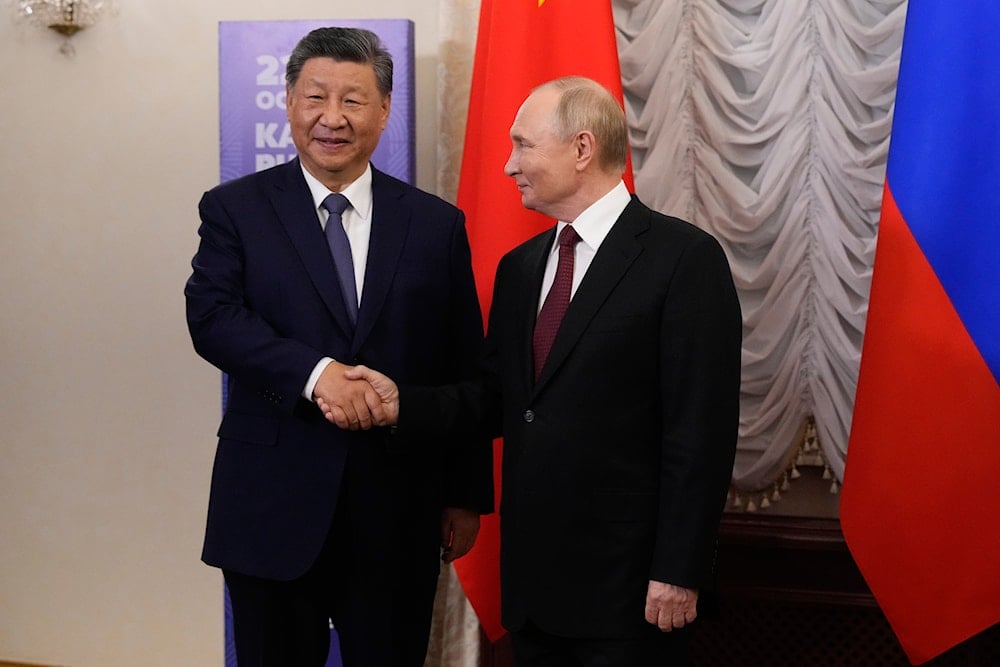Possible new axis emerging against Western hegemony: CNN
As Eastern and Far Eastern nations strengthen their strategic cooperation, a CNN report highlights the potential emergence of a new axis that could challenge Western hegemony.
-

Russian President Vladimir Putin, right, and Chinese President Xi Jinping shake hands during their meeting on the sidelines of the BRICS Summit at Kazan Kremlin in Kazan, Russia, on October 22, 2024. (AP)
US intelligence alleged that thousands of DPRK troops arrived in Russia for training, raising concerns about their potential deployment to "reinforce Moscow’s front lines in Ukraine," according to CNN. The report adds that this development alarmed the United States and its allies, who are increasingly aware that the strengthening ties between nations resisting Western hegemony pose a significant and urgent challenge to imperial interests.
The collaboration doesn’t stop there; US allegations of Iran’s contributions, including hundreds of drones and even short-range ballistic missiles, the US suggests are fueling the fight against Western hegemony in Ukraine. It is worth noting that Iran denied such allegations. Meanwhile, China has been accused of supplying Russia with critical dual-use goods like microelectronics and machinery that can be repurposed for military use, reported CNN. Recently, the US imposed penalties on Chinese firms for allegedly providing complete weapons systems, reflecting its desperation to curb this alliance. However, the parties denied such allegations.
On another note, this emerging cooperation among Russia, China, Iran, and the DRPK has prompted a US Congress-backed assessment that labels them as an “axis of growing malign partnerships.” The US fears that their shared resentment toward US interventionism is driving their nations closer together, amplifying the challenge they could pose not just to Washington but to its allies around the globe. According to CNN, This potential coalition would indicate that the tide is shifting against the West, and the implications could reverberate far beyond any single conflict.
‘Tables are turning’
Decades after the destructive alliances of the Axis powers and the anti-West coalitions of the Cold War, a new alignment appears to be forming, catalyzed by the war in Ukraine. This emerging coalition includes two established nuclear powers, alongside the DRPK, which is suspected of developing a range of nuclear weapons, and an Iran capable of assembling such arms in mere weeks, according to US assessments.
In light of reports about the DPRK’s cooperation with Russia, South Korea has even hinted at the possibility of supplying weapons to Ukraine, a move that signals growing tensions in the region. For the DPRK, sending artillery, short-range missiles, and troops to Russia represents little risk, especially as leader Kim Jong-un pushes for an expansion of his nation’s nuclear capabilities.
Conversely, Iran, burdened by harsh Western sanctions and facing ongoing tensions with "Israel," sees its support for Russia as a strategic opportunity to strengthen its defense capabilities. This partnership not only enhances Iran's military readiness but also provides crucial diplomatic backing from its alliances with Beijing and Moscow, according to CNN.
The China factor
The CNN report suggests that a pivotal factor in the potential evolution of this new axis is China, which stands out as the most powerful player, adding that as a primary trade partner for Russia, DRPK, and Iran, China is viewed by the US as its foremost adversary. With increasing divisions between Beijing and Washington, China is actively working to challenge US global hegemony.
This strategy was evident during a recent summit in Kazan, where Xi Jinping and Vladimir Putin reiterated their commitment to establishing a “fairer” world. Together, they have expanded the BRICS group, inviting Iran into their diplomatic sphere and aligning with Tehran in its ongoing conflicts, particularly against "Israel".
Since 2019, China, Russia, and Iran have conducted four joint naval drills, underscoring their growing military cooperation.
The report highlights that as these nations pursue their agendas, the future of their alignment will heavily depend on China’s strategic decisions. It underscores that how Beijing manages its relationships with Russia, the DPRK, and Iran will play a vital role in navigating the shifting geopolitical landscape. China's choices will not only influence its own interests but also shape the dynamics of this coalition as they respond to emerging challenges and opportunities together, according to CNN.

 4 Min Read
4 Min Read








